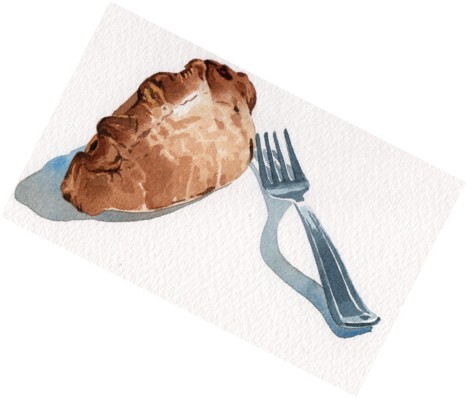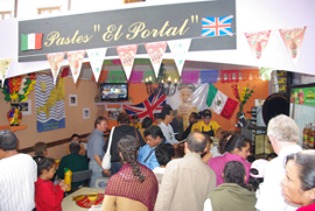
The Mexican mining industry had declined drastically during the eleven long years of the war of independence, to the point where most of the silver mines had been abandoned and became dilapidated. At the conclusion of the war in 1821, the government set about rebuilding the country and its industrial base, and in a bid to attract international capital, invited foreign mining companies to help resurrect and regenerate its mining industry. The British Real del Monte Mining Company was formed in 1824 and the story of its one year herculean journey from the coast to Real del Monte, transporting its steam engines and boilers, pumps, tools and implements manufactured in England, makes fascinating reading – details of “The Great Trek” can be found at the Cornish Mexican Cultural Society's website.
With the British mining company came the Cornish miners and their Cornish pasties – as well as football, “futbol”, soon to become Mexico’s favourite sport – and the “pastes” of Real del Monte, created by no less than 30 local producers, are now renowned throughout the country. The filling is certainly different, rich with chillies, spices and the other incomparable flavours of Mexican cuisine, and the pastry tends to be puff rather than shortcrust or flaky, but the principles remain the same - and the twin mining towns of Pachuca and Mineral del Monte bear witness to the Cornish presence, not just in their gastronomic legacy but also in their local architecture with Cornish engine houses, a Methodist church, a town clock with Big Ben chimes, a “Panteón de los Ingleses” or English Cemetery, and the many distinctly English names borne by 21st century Pachucans and Real del Monteños. The bond between the state of Hidalgo and Cornwall became even closer in 2008 when Redruth was twinned with Real del Monte and a Friendship Agreement was signed between Camborne and Pachuca.
2009 saw the launch of the hugely successful first International Paste Festival, with 8000 visitors and Pam Melville from the Poldark Mine in Cornwall demonstrating traditional Cornish pasty making. The second Festival is scheduled to place between 8 and 10 October 2010, and while pastes filled with meat, potatoes, onions and swede may be on offer, beans with potatoes and chorizo, green or red “mole”, savoury “tinga”, rice pudding or pineapple are all far more likely alternatives. For more information on the Paste Festival, visit the Cornish Mexican Cultural Society's website or contact Ricardo Ludlow, the organiser and Chairman of the Mexican Chapter of the Cornish Society, at mail ricardo(at) cornish (dash) mexico (dot) org.

A Mexican pasty – un paste mexicano
Makes 8 pasties
100 g/4 oz black beans, rinsed
1 bay leaf
225 g/8 oz tomatoes, halved
4 garlic cloves, unpeeled
30 ml/2 tbsp olive oil
200 g/7 oz onions, peeled and coarsely chopped
150 g/5 oz chorizo, diced
5 ml/1 tsp chipotle chilli purée or powder, or to taste
5 ml/1 tsp Mexican or Greek oregano
275 g/10 oz potatoes, scrubbed, diced and steamed until tender
600 g/1 lb 6 oz ready to use puff pastry
1 egg, beaten
Sea salt and freshly ground black pepper
Place the beans in a large saucepan with the bay leaf, add enough water to cover by 10 cm/4 in, and bring to the boil over medium heat. Turn the heat down to low, cover the saucepan and simmer very gently for about 2 hours, until the beans are totally tender. Check them every now and then to make sure that they are not drying out and are covered by at least 1 cm/1/2 in of water. The beans can be cooked ahead of time and refrigerated for 3 days.
Heat the grill to high. Line the grill pan with kitchen foil and arrange the tomatoes, cut side up, and garlic cloves on it. Grill 10 cm/4 in from the heat for about 20 minutes, until lightly charred, turning the garlic cloves over half way through. Cool, then peel the garlic cloves and place them in a food processor with the tomatoes and any juices. Process to a chunky purée.
While the tomatoes are grilling, heat the olive oil in a frying pan and cook the onions until soft and golden. Stir in the chorizo and chipotle chilli and cook for a further 10 minutes, until the chorizo starts to brown. Add the tomato purée, oregano, potatoes and some seasoning, and cook over medium heat for 5 minutes.
Drain the beans and mash them coarsely with a potato masher or the back of a wooden spoon before stirring them into the tomato mixture. Check the seasoning and set aside until cold. The filling can be prepared ahead of time and refrigerated for up to three days.
Roll the puff pastry out to a thickness of 1.5 mm and cut 8 circles about 6 in/15 cm in diameter. Spoon the filling into the centre of the circles, leaving a good 2.5 cm/1 in border. Brush the pastry border with beaten egg and carefully bring the edges up and over the filling to enclose it completely. Crimp the edges firmly between your thumb and index and middle fingers to seal and brush the pasties all over with the remaining egg. Lift them onto a baking sheet and chill for 15 minutes.
Preheat the oven to 180oC/350oF/gas 4/fan oven 160oC and cook the pasties for approximately 30 minutes, until the pastry is golden.
Serve immediately.
Buén provecho!


